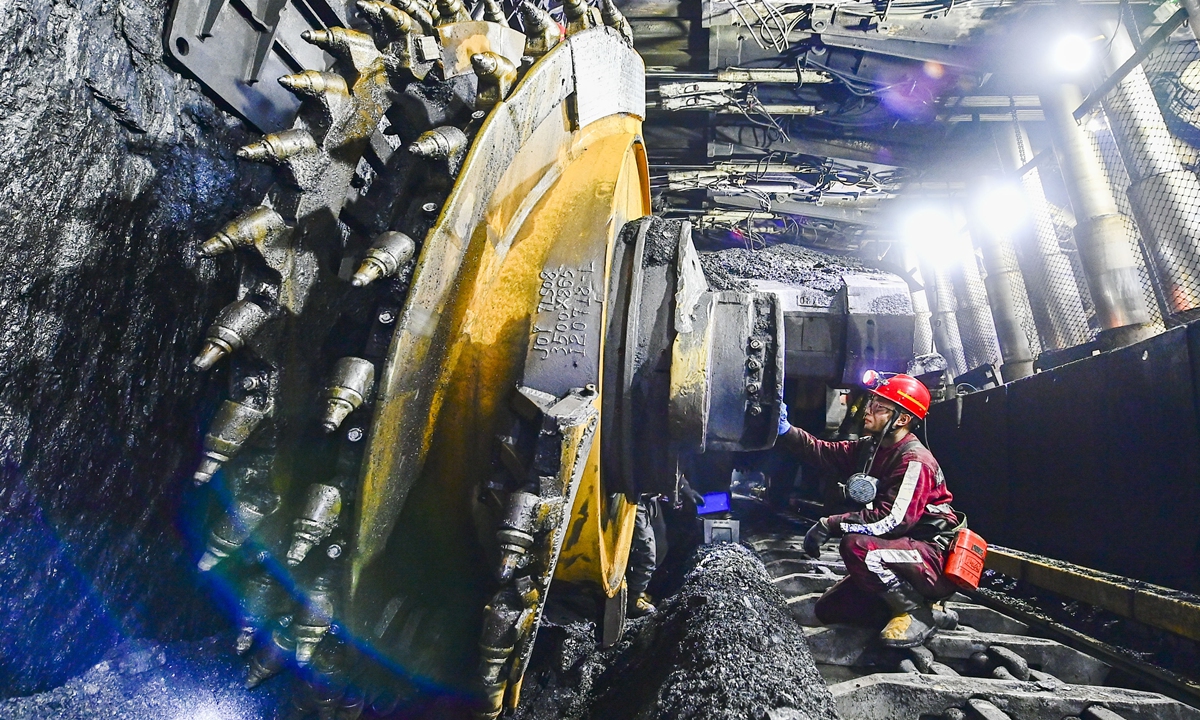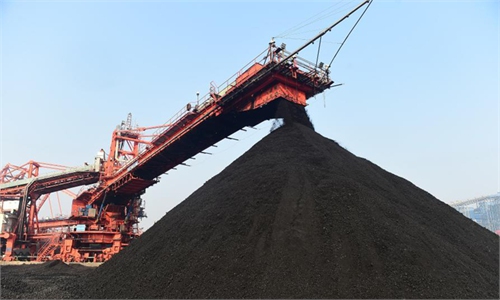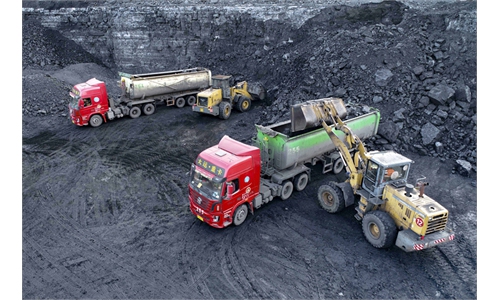Premier Li calls for ‘all-out’ efforts to ensure ‘warm winter’
Supply still tight, but will be used to ensure livelihood

A worker overhauls a mining machine at a coal mine in Ejin Horo Banner, North China's Inner Mongolia Autonomous Region on Tuesday. In response to the coal shortage in China and on the premise of ensuring environmental and production safety, Ejin Horo Banner resumed output at mines that passed safety inspections. Daily output now exceeds 660,000 tons. Photo: VCG
Chinese Premier Li Keqiang reiterated on Wednesday the country's commitment to ensuring people's heating, and continuing the efforts to crack down on coal marketing speculation, a clear and firm voice from the central government to put people's livelihood at the forefront after a series of measures that have been taken over the past weeks to ensure the coal supply.
During the State Council executive meeting on Wednesday, Li called for "all-out" efforts to ensure coal production and transportation for people's heating use, especially in the northern part of the country, where cold weather comes earlier this year.
The meeting vowed to organize enterprises to increase gas supply, coordinate gas resources, and a more localized measure to ensure the people's heating requirements, while asking local authorities to keep gas and heating prices at a stable level.
The meeting also asked local authorities and companies to reasonably control the lighting of night scenes to promote energy conservation.
On the same day, officials from the National Development and Reform Commission (NDRC), the country's economic planner, conducted field inspections to the ports of Qinhuangdao and Caofeidian in North China's Hebei Province, summoning energy companies to ensure thermal coal supply for the winter and vowing to crack down on hoarding and speculating activities.
Inspectors told companies to strictly stick to long-term contracts, guide coal prices to fall back to "rational ranges," optimize the production/transportation process, and prioritize the supply of thermal coal and for heating use.
A separate NDRC inspecting team to a coal storage and distribution center in Hebi, Central China's Henan Province vowed to better manage the spot trading market, crack down on capital speculations on spot coal, and publicize the wrongdoings.
"These are the strongest coal supply guarantee measures I've ever seen," Lin Boqiang, director of the China Center for Energy Economics Research at Xiamen University, told the Global Times on Wednesday.
'All-out' national effort
The "coal-supply guarantee battle" has been going on for months. It's been a national effort under the macro guidance of the central government.
At the Port of Rizhao in East China's Shandong Province, the urgently-needed thermal coal mined and transported from northern parts of the country were being loaded on ships to be sent to other Chinese ports, as traders and wholesalers try to secure coal supply as the winter heating season approaches.
The scene mirrors how each link in the coal supply chain--from mines to transportation to seaports--is ramping up supply of thermal coal under the central government's call to guarantee coal supply "at all costs" amid a power shortage that has been lasting for months.
NDRC has asked all regions to safely maintain normal production at coal mines even during holidays and major events, and to strictly prohibit the practice of shutting down coal mines or to suspend production in an entire region due to individual coal mine accidents.
The NDRC said it would ensure coal mines operate at full capacity and to achieve at least 12 million tons per day of output, which would be up more than 1.6 million tons from late September.
China Resources Power Company, a major power-generating company in China, said in a note sent to the Global Times on Wednesday that it has taken multiple measures to secure coal supply for its power plants in central and eastern provinces.
One of its subsidiaries asked fuel supply departments to ramp up coal inventories at power plants to a "required level" before November 15, the date northern provinces start winter heating, the firm said.
The National Energy Administration also approved the construction of three new mines in Northwest China's Gansu Province on Tuesday, with a scale of 2.4 million tons, 1.5 million tons, and 2 million tons output per year, respectively.
The swift measures have already worked. Official data released on Tuesday showed that average daily output has increased by more than 1.2 million tons from September.
The daily coal output on Monday has exceeded 11.6 million tons, a new high this year. Coal storage at power plants nationwide is nearly 88 million tons, which can be used for 16 days, an increase of more than 9 million tons from the beginning of the month. The power plants in the three northeastern provinces, the country's most coal-needed region, have coal storage enough for 24 days, an increase of 11 days from the beginning of the month.
Supply still tight
There's no doubt that the country can ensure a "warm winter" with a slew of supply measures. But even with the accelerated efforts, a release of production capacity may not be that fast, industry players and analysts told the Global Times.
The Global Times observed traders are still scrambling in hopes of securing stable supply.
A wholesaler surnamed Shi in Rizhao told the Global Times on Wednesday that a scarcity of coal on the market has forced his company to send procurement managers to North China's Shanxi Province, one of the major coal hubs, to look for supplies.
"Although some regions in North China have recently been hit by flooding, the coal mines were not affected much, but the tricky thing is what little supply I can get are only several hundred tons. So I have to use trucks to transport coal back," Shi said.
A manager surnamed Yu at a coal testing company said insufficient coal supply in the market has forced some users to buy low-grade fuel low in thermal power as a temporary measure.
"It may take at least one to two months before the tight supply situation is eased," Lin said.
The scarcity has also driven coal prices to a record high over the past days. NDRC vowed on Tuesday that it will resort to "all necessary means" based on the country's price law, mulling concrete measures to intervene in coal prices, as the official stance grows harsher on runaway coal prices that have put coal supplies at stake.
The Zhengzhou Commodity Exchange said on Wednesday evening that it will set a transaction limit on some thermal coal futures contracts to curb soaring prices.
"State-owned firms will be the first to carry out the price limit, while private firms will soon follow," Han Xiaoping, chief analyst at energy industry website china5e.com, told the Global Times on Wednesday.
"It's a matter that's closely connected with people's livelihood, that's why the government will take it seriously," Han said.
The main coal production bases in North China's Shanxi Province, Northwest China's Shaanxi Province and North China's Inner Mongolia Autonomous Region are required to immediately lower prices by 100 yuan a ton starting Tuesday, and officials in Yulin, a coal mining hub in Shaanxi, said all state-owned mines there would cut prices by 6pm on Tuesday, according to industry outlet coalresource.com.
Companies that don't comply will face administrative measures imposed by different departments, the outlet said.
Lin also warned that as winter approaches, high energy-consuming factories' activities could be further limited in a bid to ensure residents' heating demand, which may also drag China's fourth quarter economic performance.
Carbon neutrality to continue
While pushing forward coal production, China has also asked its power grid companies and relevant authorities to promote the use of new energy power generation projects, refuting some western media's claim that China is undermining its carbon neutrality promise under the pressure of power shortage.
Speeding up the construction of wind power and photovoltaic power generation projects and increasing the supply of clean power will not only help alleviate the supply crunch, but also help promote transit to low-carbon energy, said the National Energy Administration on Wednesday.
Guo Shuqing, Chairman of the China Banking and Insurance Regulatory Commission, said on Wednesday that to achieve CO2 emissions peak before 2030 means that China will continue to maintain a rigid growth in fossil energy consumption for a period of time in the future.
China will continue to actively explore new energy sources such as low-carbon and zero-carbon, and carry out research and application of carbon capture and storage technologies, Guo said. But he warned that "they must not be divorced from reality," noting that China will ensure a smooth transition, rather than a "one size fits all" way.
China's slew of measures to ensuring coal supply also come as coal, oil and gas prices have skyrocketed amid a worsening global energy crisis over the past weeks, hammering factories and consumers from Beijing to Brussels.
A swift and effective response from the world's second-largest economy will also prevent inflation from further rising, which risks slowing down a global recovery from the COVID-19 pandemic, experts said.



